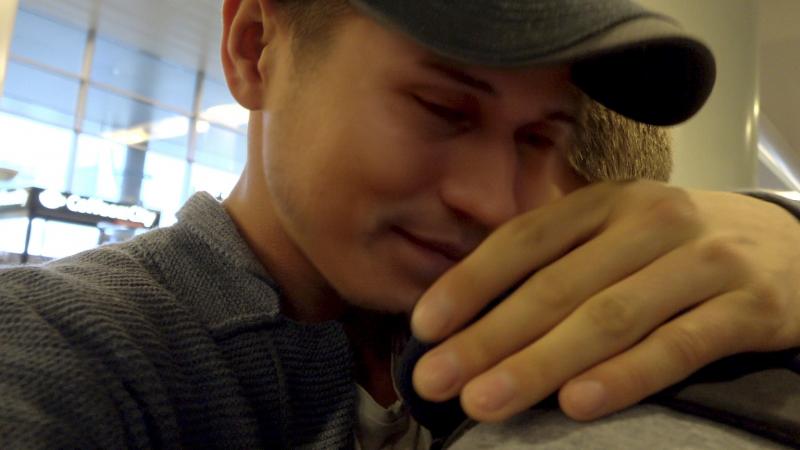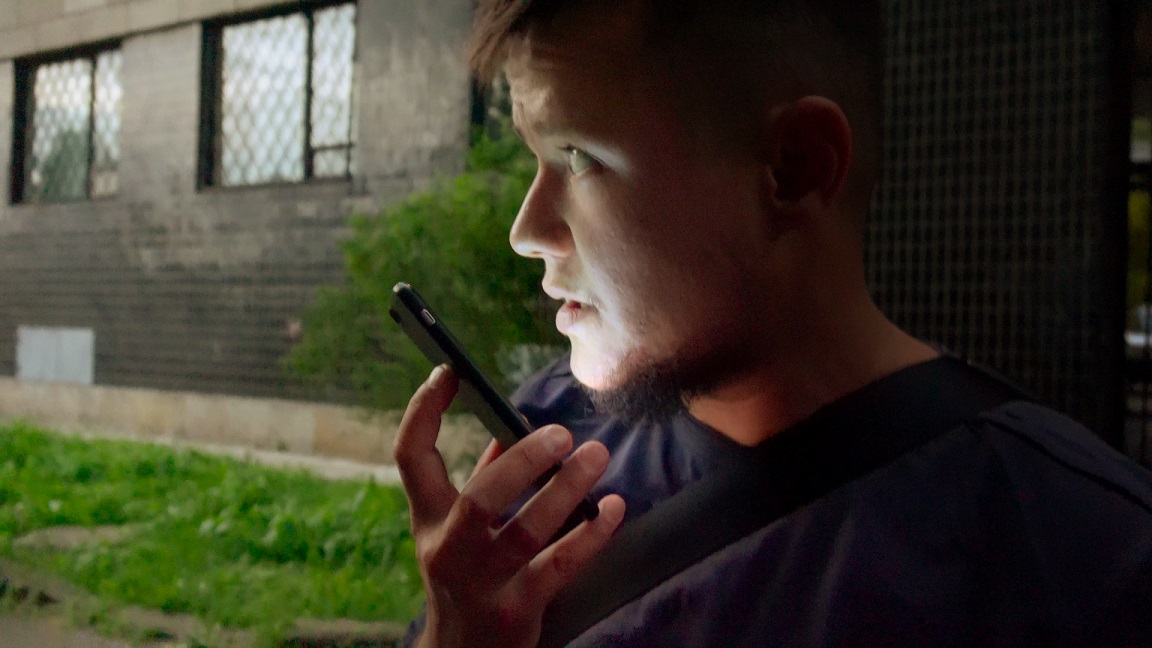Storyville: Welcome to Chechnya, BBC Four review - trauma, tension and resistance | reviews, news & interviews
Storyville: Welcome to Chechnya, BBC Four review - trauma, tension and resistance
Storyville: Welcome to Chechnya, BBC Four review - trauma, tension and resistance
David France's 'guerrilla' documentary charts brave Russian response to extreme anti-LGBTQ campaign

David France’s revelatory film may have been subtitled “The Gay Purge”, but from the start it was clear this wasn’t just another documentary from Russia charting the increasing pressure faced by that country’s queer community.
On one level, of course, Welcome to Chechnya looked to be about exactly that – and on a more extreme level than anything we’ve seen before. The story that it followed had started back in 2017, with a crack-down by the authorities in the southern republic of Chechnya that saw widespread police torture of gay men; in a society where concepts of family shame and honour killing remain absolutely real, victims were then handed over to their families, most probably to be murdered by them, the same fate awaiting women as well. Interspersing the film we saw snatches of video (shot by the perpetrators, intercepted by activists) that showed just that happening, a “gay purge” being carried out in horrifically vivid detail.
But the real subject of France’s film was something else, something (perhaps) more surprising, and (definitely) more life-affirming – how, even in such bleak circumstances, there were people prepared to do something about what was happening. Welcome to Chechnya opened with footage of activist David Isteev (pictured below) waiting anxiously on his phone, listening to 21-year-old “Anya” – the names of all except the activists were changed, their faces and voices disguised – from the Chechen capital Grozny, tell how she was being blackmailed by a family member threatening to reveal her sexuality. For most of the 100 minutes that followed, Isteev seemed to be in much the same position, trying to juggle the fates of those who had ended up under his protection as he attempted to spirit them to safety. His almost incredible sang froid was matched only by that of his colleague Olga Baranova.  Isteev was the aptly titled “crisis intervention coordinator” for Russia’s largest gay rights group, The Russian LGBT Network, Baranova the director of the Moscow-based Community Center for LGBTI+ Initiatives. Together with various support initiatives, they had come to oversee a network that had arisen almost spontaneously back in 2017 to respond to what was happening in Chechnya. Managing to extricate men and women from there, they looked after them in safe houses in Moscow and elsewhere, before finally – in the best outcome, at least – relocating them to where they could live in safety. Which meant, in the cases we saw here, abroad, in which they were assisted by a range of international gay organisations, as well as those embassies in Moscow, Canada clearly prominent among them, that proved receptive.
Isteev was the aptly titled “crisis intervention coordinator” for Russia’s largest gay rights group, The Russian LGBT Network, Baranova the director of the Moscow-based Community Center for LGBTI+ Initiatives. Together with various support initiatives, they had come to oversee a network that had arisen almost spontaneously back in 2017 to respond to what was happening in Chechnya. Managing to extricate men and women from there, they looked after them in safe houses in Moscow and elsewhere, before finally – in the best outcome, at least – relocating them to where they could live in safety. Which meant, in the cases we saw here, abroad, in which they were assisted by a range of international gay organisations, as well as those embassies in Moscow, Canada clearly prominent among them, that proved receptive.
The film’s production was obviously clandestine, “guerilla” filmmaking to a tee, with director France and his cinematographer Askold Kurov seeking invisibility as they worked with handheld cameras, and catching what they could on phones when that was the only way to operate. The main location we saw was one of the Moscow safe houses that provided a temporary home for those en route to somewhere else; its routine of wary everyday life, interspersed by periodic departures for the airport, seemed almost normal until painfully broken by a traumatised young man attempting suicide.
The fate of his call for investigation would be depressingly familiar
But the greater part of the action of Welcome to Chechnya was caught on the move, with a disturbingly convincing tension, as the film followed various strands as they developed, unpredictably, in real time (it’s a considerable achievement, not least in editing, to make such an approach convincing rather than contrived). We witnessed Anya’s extrication from Chechnya across the mountains, the first step in an evacuation that saw her moved to temporary safety in the hinterland of a neighbouring country (her journey would go no further, not the only example where family coercion or other intervention would prove more powerful than fear). Another agonising airport moment came when “Grisha” flew to lasting safety abroad, accompanied not only by his boyfriend but by his family as well: the threats of the Chechen power structures extended so far in Russia that all concerned were in peril, and so had to be moved.
It was Grisha’s particular situation that brought the film's action into direct contact with officialdom. He had been in Chechnya for work when he was caught and tortured by the police, his difference in circumstances – principally the fact of his being an ethnic Russian meant that he was released – finally giving him the courage to go public about what had happened and demand that the authorities investigate. We witnessed the dramatic press conference, organised by Russia’s Committee against Torture, at which that happened, which was also the moment that the film let slip the visual technique that had allowed the director to “mask” the faces of his subjects (the pioneering effect essentially reverses the image-manipulating possibilities of DeepFake). Grisha – now going by his real name, Maxim – may have had his identity finally “restored”, but the fate of his call for investigation would be depressingly familiar, refused in another rote court decision (his fight for justice continues at the European Court for Hight Rights).
The darkness was painfully visible throughout Welcome to Chechnya, but France somehow managed to close the film in light – a beam, however tentative and hesitant, that nevertheless shone through with affirmation. When he made his first documentary, 2012's How to Survive a Plague, about the early AIDS activists in America, the director didn't hesitate to describe his protagonists there as “heroes”, for the way that they stood up for what they believed in, against adversity: it's an accolade that seems no less appropriate here.
The future of Arts Journalism
You can stop theartsdesk.com closing!
We urgently need financing to survive. Our fundraising drive has thus far raised £49,000 but we need to reach £100,000 or we will be forced to close. Please contribute here: https://gofund.me/c3f6033d
And if you can forward this information to anyone who might assist, we’d be grateful.

Subscribe to theartsdesk.com
Thank you for continuing to read our work on theartsdesk.com. For unlimited access to every article in its entirety, including our archive of more than 15,000 pieces, we're asking for £5 per month or £40 per year. We feel it's a very good deal, and hope you do too.
To take a subscription now simply click here.
And if you're looking for that extra gift for a friend or family member, why not treat them to a theartsdesk.com gift subscription?
more TV
 Slow Horses, Series 5, Apple TV+ review - terror, trauma and impeccable comic timing
Jackson Lamb's band of MI5 misfits continues to fascinate and amuse
Slow Horses, Series 5, Apple TV+ review - terror, trauma and impeccable comic timing
Jackson Lamb's band of MI5 misfits continues to fascinate and amuse
 Coldwater, ITV1 review - horror and black comedy in the Highlands
Superb cast lights up David Ireland's cunning thriller
Coldwater, ITV1 review - horror and black comedy in the Highlands
Superb cast lights up David Ireland's cunning thriller
 Blu-ray: The Sweeney - Series One
Influential and entertaining 1970s police drama, handsomely restored
Blu-ray: The Sweeney - Series One
Influential and entertaining 1970s police drama, handsomely restored
 I Fought the Law, ITVX review - how an 800-year-old law was challenged and changed
Sheridan Smith's raw performance dominates ITV's new docudrama about injustice
I Fought the Law, ITVX review - how an 800-year-old law was challenged and changed
Sheridan Smith's raw performance dominates ITV's new docudrama about injustice
 The Paper, Sky Max review - a spinoff of the US Office worth waiting 20 years for
Perfectly judged recycling of the original's key elements, with a star turn at its heart
The Paper, Sky Max review - a spinoff of the US Office worth waiting 20 years for
Perfectly judged recycling of the original's key elements, with a star turn at its heart
 The Guest, BBC One review - be careful what you wish for
A terrific Eve Myles stars in addictive Welsh mystery
The Guest, BBC One review - be careful what you wish for
A terrific Eve Myles stars in addictive Welsh mystery
 theartsdesk Q&A: Suranne Jones on 'Hostage', power pants and politics
The star and producer talks about taking on the role of Prime Minister, wearing high heels and living in the public eye
theartsdesk Q&A: Suranne Jones on 'Hostage', power pants and politics
The star and producer talks about taking on the role of Prime Minister, wearing high heels and living in the public eye
 King & Conqueror, BBC One review - not many kicks in 1066
Turgid medieval drama leaves viewers in the dark
King & Conqueror, BBC One review - not many kicks in 1066
Turgid medieval drama leaves viewers in the dark
 Hostage, Netflix review - entente not-too-cordiale
Suranne Jones and Julie Delpy cross swords in confused political drama
Hostage, Netflix review - entente not-too-cordiale
Suranne Jones and Julie Delpy cross swords in confused political drama
 In Flight, Channel 4 review - drugs, thugs and Bulgarian gangsters
Katherine Kelly's flight attendant is battling a sea of troubles
In Flight, Channel 4 review - drugs, thugs and Bulgarian gangsters
Katherine Kelly's flight attendant is battling a sea of troubles
 Alien: Earth, Disney+ review - was this interstellar journey really necessary?
Noah Hawley's lavish sci-fi series brings Ridley Scott's monster back home
Alien: Earth, Disney+ review - was this interstellar journey really necessary?
Noah Hawley's lavish sci-fi series brings Ridley Scott's monster back home
 The Count of Monte Cristo, U&Drama review - silly telly for the silly season
Umpteenth incarnation of the Alexandre Dumas novel is no better than it should be
The Count of Monte Cristo, U&Drama review - silly telly for the silly season
Umpteenth incarnation of the Alexandre Dumas novel is no better than it should be

Add comment